Mariner will be away from the keyboard for a few days. Here are some quickies as he leaves.
Favorably rated nations
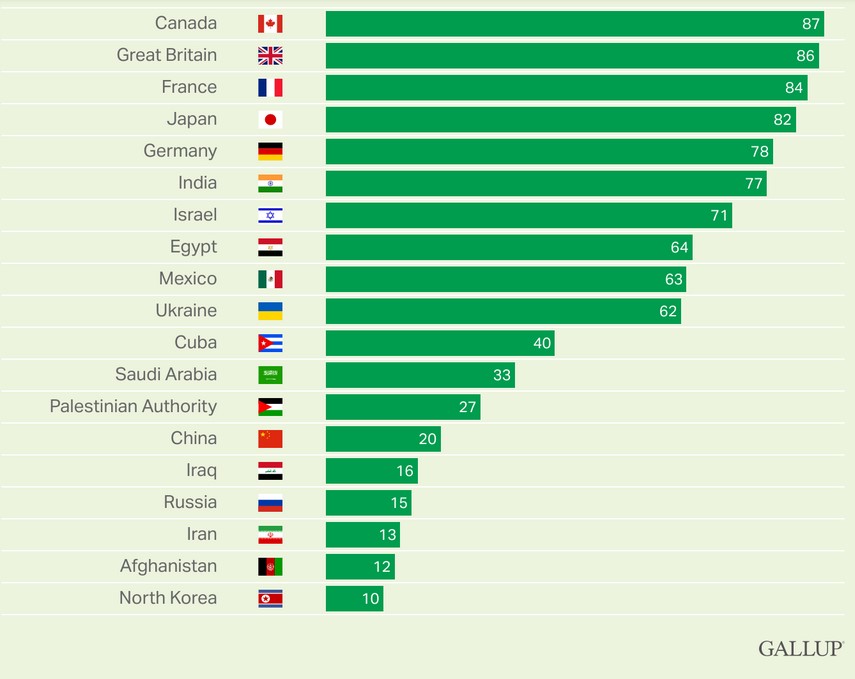
Cities with the most listed Million Dollar Homes
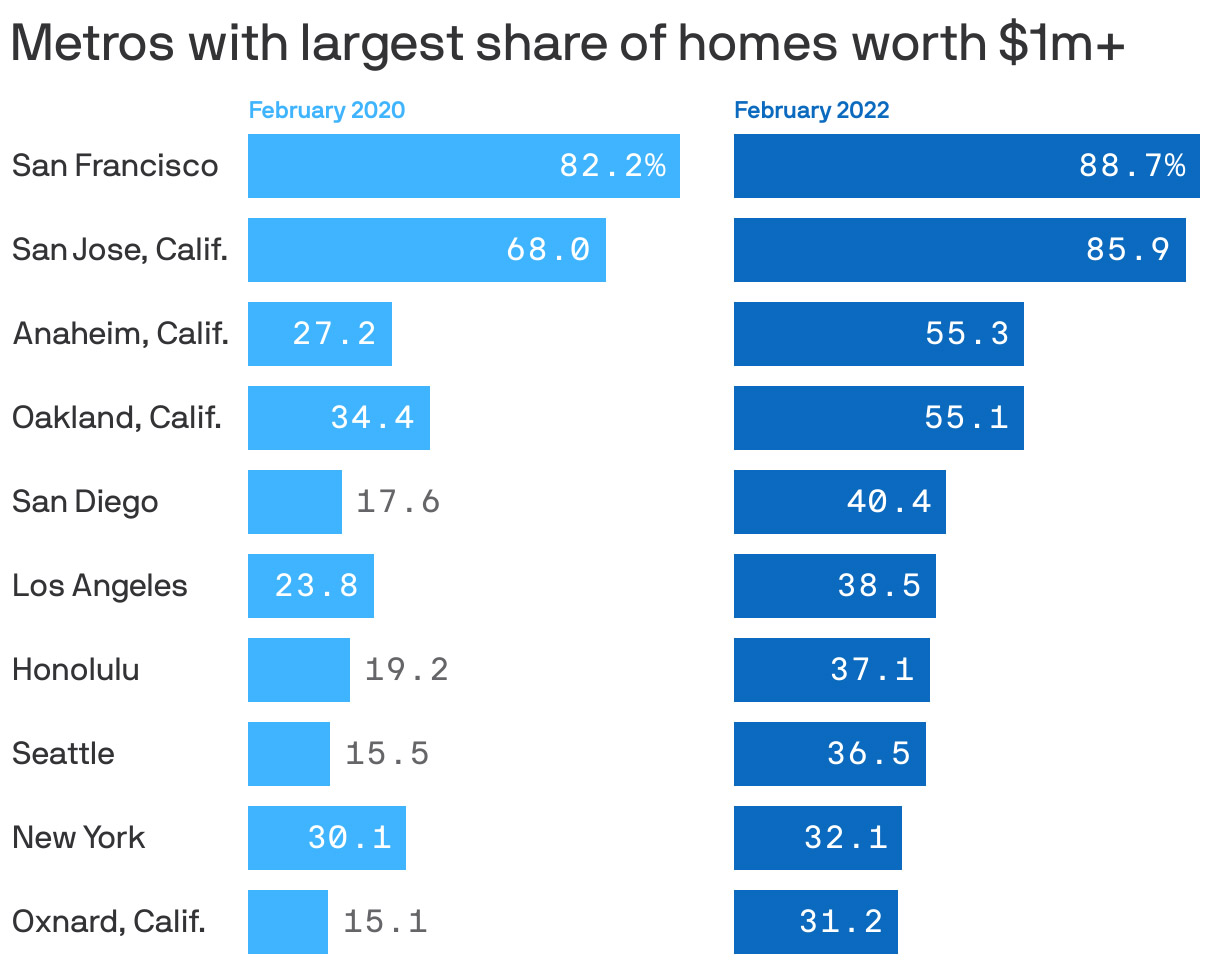
Consumer Price Index (CPI)
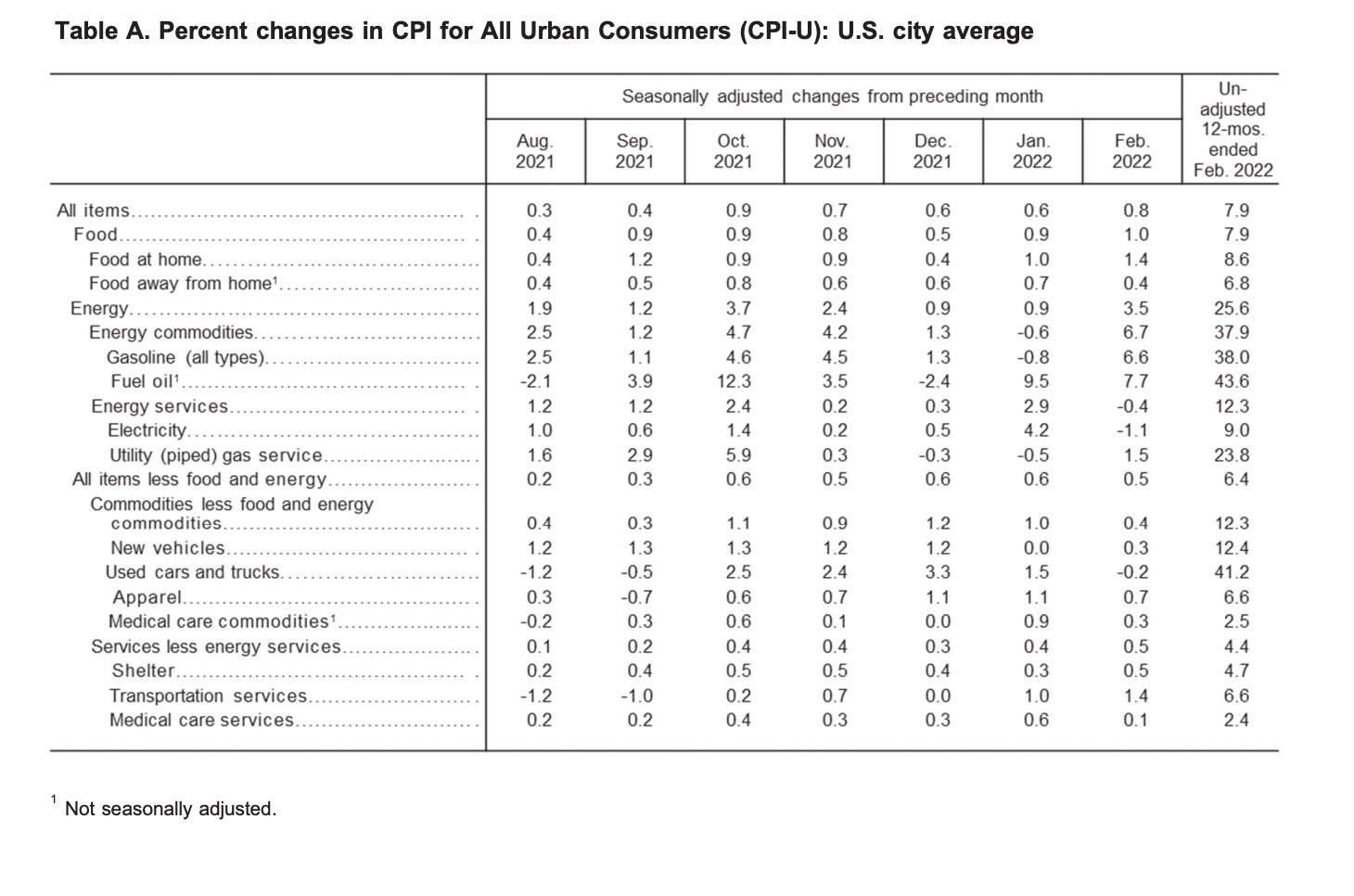
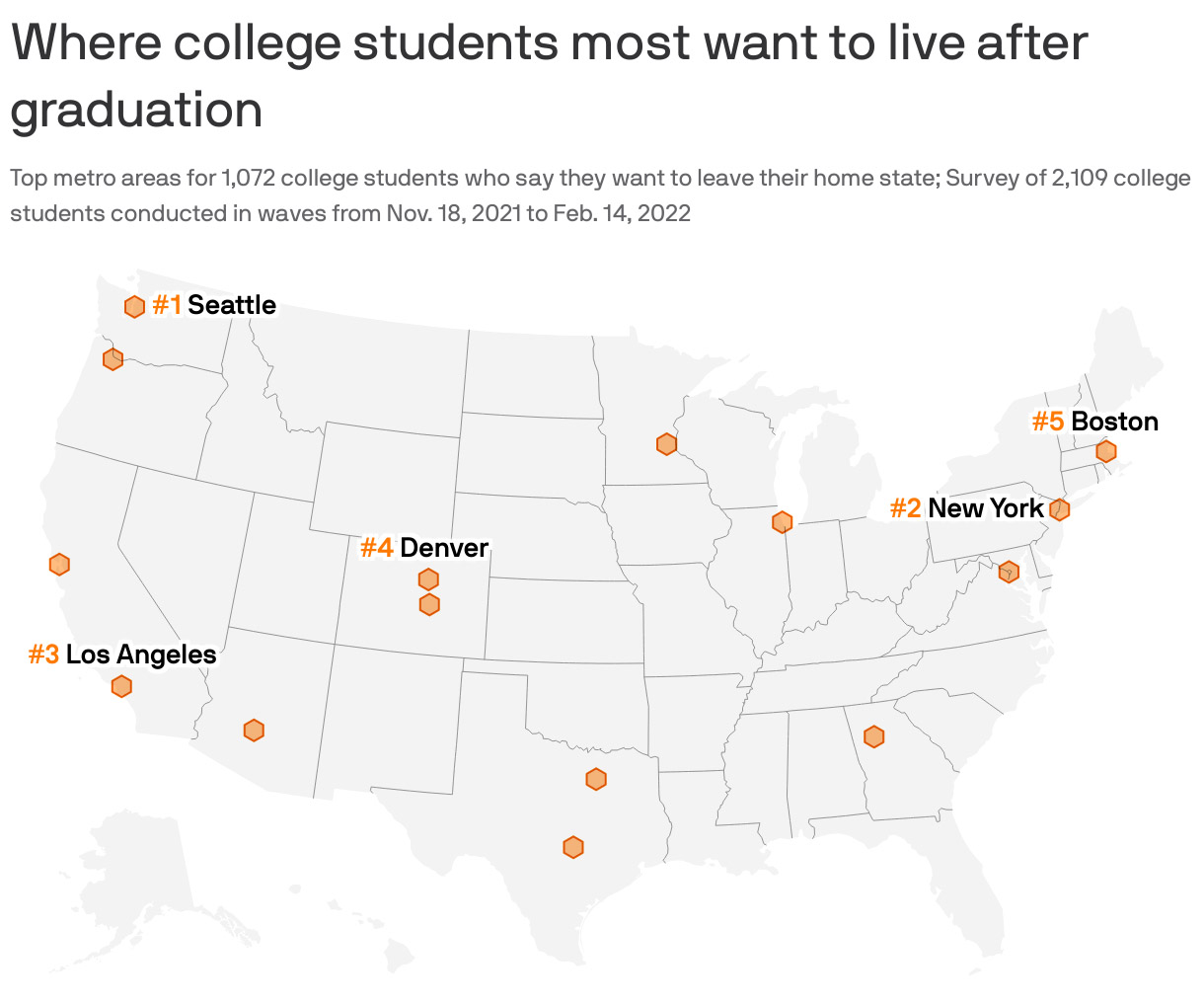
Ancient Mariner
Ancient Mariner

Mariner will be away from the keyboard for a few days. Here are some quickies as he leaves.
Favorably rated nations

Cities with the most listed Million Dollar Homes

Consumer Price Index (CPI)


Ancient Mariner
Ancient Mariner
Consumer prices are up 7.9% from a year ago. It will get worse after Russia’s invasion of Ukraine sends energy prices surging. According to AAA, Gasoline prices have jumped 59 cents a gallon in just the last week. Diesel prices have jumped even more sharply, to nearly $5.06 per gallon.
It isn’t just the energy sector showing signs of breakaway prices. Unfortunately, even sadly, small businesses that were ravaged by Covid now face rapidly increasing costs for inventory. Many local economies have no reserve and further, their customer base has never had a chance to stabilize.
Nationally, the Federal Reserve will be forced to raise interest rates more than it would like. In the moment, these interest increases seem minor but in fact are very expensive for the consumer. Consider the housing market, already screwed up by housing shortages that create their own inflation. NBC had a good example in its morning report:
“Let’s say a consumer wants to buy a $500,000 home; they get a $400,000 mortgage at a 30-year fixed rate. They would pay about $80,000 more over the loan’s term and about $200 more each month with a 4% mortgage rate versus 3%.”
In fact, any family indebtedness can suddenly loom too large to handle. If a reader has variable rate loans, make every effort to convert them to fixed rate loans. Pay attention to credit card debt; credit card finance charges are exorbitant in any case – adjust home budgets to pay down card debt more rapidly.
Savings accounts, on the other hand, stand to receive higher interest rates. Keep an eye on several types of savings products from local banks to bonds to online banks.
Setting aside normal consumer purchasing of clothes, vacations, automobiles, home improvement and other extraneous buying, it is at the dinner table, at child care, at college tuition, at insurance payments and elderly care that inflation’s tires meet the road. Salary never keeps up with inflation but costs do.
So take a good look at future expenses like taxes, insurance, travel cost and other larger cost items that may cause issues that can defeat staying within one’s income. Be prepared.
Ancient Mariner
The ViVE health tech conference was held in South Florida this week, with some clear themes emerging. All the worrisome things like privacy, intimacy, database diagnostics, venture capital investments and automated insurance-diagnostics-limited-options all  were on the table. Oh, by the way, meet your new floor nurse (on the left conversing with a physician). Warm, caring, compassionate human nurses will be missed.
were on the table. Oh, by the way, meet your new floor nurse (on the left conversing with a physician). Warm, caring, compassionate human nurses will be missed.
Mariner visited a sick friend today and barely could climb through cables, monitors, banks of wall plugs and the patient‘s arm loaded with tubes and monitors. The only visitors to the room were a social worker and nurses who tended sheets and cleanup generally. Mariner felt like he was in the switch room in Matrix – with Big Brother watching through squinty backlit eyes.
The automated nurse will roll into the room. Through electronic receivers, (she?) will read all the stuff running in the room, the demeanor of the patient, turn around and roll out. While it wasn’t clear in the description, it is likely the nurse also can automatically modify doses and other treatments. One must make a choice whether to trust more a robot using database generalizations for treatment, or a human doctor influenced by unusual circumstances or moral convictions.
But on to the big picture: the confrontation between medical automation, the fractured perception of benefits for a job world that is dramatically changing, the vagaries of capitalism, and elected governments with their heads where the Sun don’t shine.
Just to assure the reader that there WILL be change, the Republicans are pushing two bills that would eliminate Social Security and Medicare. This in a world where a relative of mariner’s broke their ankle and was billed $40,000 and a world where mariner was offered a prescription for $10,000 per month. The Republicans are attempting to remove government cost from a runaway capital gains medical system but don’t care if the cost wipes out financial security for anyone unlucky enough to need medical care.
As abstruse as it may seem, our governments should look at ways to disassociate medical benefits from salary/age altogether. It’s another post to discuss that Presidential candidate Andrew Yang advocated a $1,000 dole to every citizen but there is an imminent shift coming to the US workforce because of artificial intelligence and a significant benefit at risk is healthcare.
As usual, mariner is quick to provide a metaphor.
The metaphor is about how customers tip restaurant waiters and waitresses. If a waiter works in a restaurant similar to Denny’s, breakfast may cost as little as $5.00. If the waiter receives a 20 percent tip, it amounts to $1.00. If the waiter works the lunch shift, the meal may cost $9.00 so a 20 percent tip would be $1.80 – for the same amount of work and skill. If the waiter works the dinner shift, dinner may cost $14.00 so the 20 percent tip would come to $2.80 – for the same amount of work and skill.
Consider the tip to be a healthcare benefit. If one is lucky enough to have better insurance, the fears of health liability are less worrisome. However, metaphorically speaking the vast majority of folks serve breakfast and face devastating circumstances from illness or assisted living.
As it turns out, artificial intelligence will move hundreds of thousands of folks into breakfast tip amounts and therefore healthcare is a much larger, much more moral issue than it is today.
The fat cats wanting to invest at the Florida conference would not like to have standardized healthcare costs – like Social Security and Medicare.
Incidentally, both mariner’s children worked in restaurants. They told mariner never to tip less than $5.00. It has something to do with awarding dignity.
Ancient Mariner
The issue is the precarious balance of democracy in the world’s most noted democracy. Serious, lengthy articles are beginning to appear in several web news and print sources led by an Atlantic Magazine article written by Hillary Rodham Clinton, a former U.S. senator and secretary of state and Dan Schwerin, a co-founder of Evergreen Strategy Group. He served in the White House and the State Department. Here an opening paragraph:
“The scope of that wider struggle was on vivid display on February 4. In Beijing, the world’s two most powerful autocrats—Putin and China’s Xi Jinping—cemented their deepening alliance. In the United States, where American leaders should have been unified in championing democracy against these aggressive adversaries, the opposite happened: The Republican National Committee formally declared the violent insurrection of January 6, 2021, to be “legitimate political discourse.”
![]() That the Republican Party continues their irrational support of Trumpian autocracy should warn the electorate about attacks on the way the United States operates. The Republican Party has not dropped Donald but has embraced him for the 2024 election. Ten states have shifted power over elections to partisan agencies. Gerrymandering continues to rob citizens of the principle ‘one person, one vote’. The IRS has been stripped of employees to the extent the agency can’t afford to investigate the complex returns of the oligarchy. Under the guise of budget, the US Post Office pulled hundreds of mailboxes off the street during the 2020 election. During this century both political parties have failed to protect the average citizen from venture capitalists who have destroyed thousands of low income homes so that expensive apartments and businesses have space to build. Children are open targets for murder because gun laws have been quashed. For the past fifty years the culture of police departments has shifted from a peacekeeping force to a military force.
That the Republican Party continues their irrational support of Trumpian autocracy should warn the electorate about attacks on the way the United States operates. The Republican Party has not dropped Donald but has embraced him for the 2024 election. Ten states have shifted power over elections to partisan agencies. Gerrymandering continues to rob citizens of the principle ‘one person, one vote’. The IRS has been stripped of employees to the extent the agency can’t afford to investigate the complex returns of the oligarchy. Under the guise of budget, the US Post Office pulled hundreds of mailboxes off the street during the 2020 election. During this century both political parties have failed to protect the average citizen from venture capitalists who have destroyed thousands of low income homes so that expensive apartments and businesses have space to build. Children are open targets for murder because gun laws have been quashed. For the past fifty years the culture of police departments has shifted from a peacekeeping force to a military force.
The health industry continues to limit the number of doctors that can complete studies each year. Pharmacies are charging Americans four to ten times what they charge other nations. The oil industry has essentially shut down climate change intentions. And on and on . . .
Let’s face it. The United States is broken. Not only is it broken, autocratic interests are intent on taking the nation down for good.
Not since the Civil War has each and every vote been so critical to save the principles of a free democracy.
Ancient Mariner
Below are random thoughts collected from mariner’s alter egos about trends in society and history that are too large to be noticed daily and so slow in impact that, today at least, they don’t matter.
֎ Migration from the coasts. Axios, an online news source, reports that a trend is well underway which involves a significant number of people relocating from the coasts and current centers of commerce to twenty heartland states. Three major causes are the ability to work from home, the internet enables large corporations to relocate for tax purposes and an awareness of the impact of global warming on the coasts – ocean levels are expected to rise one foot by 2050. Map below:
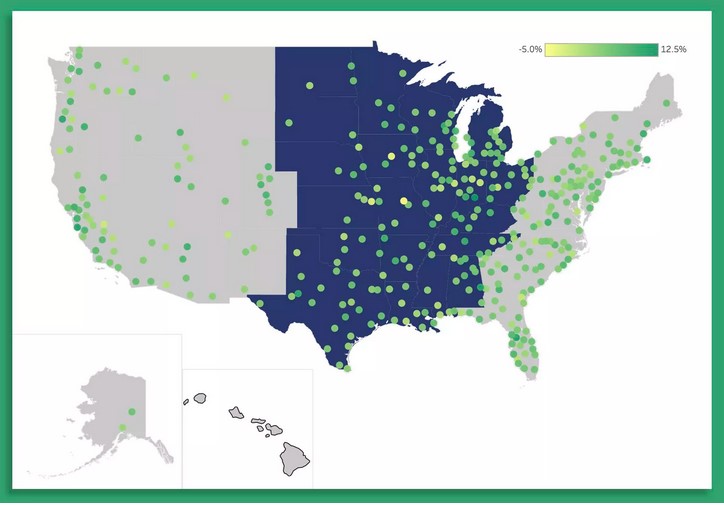
Mariner mentions this trend because it is a shift in winds by the nation’s cultural ideology about what it means to be successful. Since the 1960s one was considered upwardly mobile and successful if they were able to escape the local scene and become part of the world of big-time success, typically large corporations, universities and the world of the Fortune 500. One could ask whether today’s working class (including the trumpers) will ever again be the center of the nation’s work ethic, will ever again bask in the glory days of Rosie the Riveter and the political influence of the AFL/CIO. In the future one wonders where the collective identity of a U.S. citizen will emerge – given the isolating characteristics of working from home and the extensive automation of manufacturing. In the future what cultural characteristic will define a successful individual?
֎ The disappearance of Christianity. Among the major religions of the world,  Christianity is the most spiritual. To be a Christian requires an eagerness to put aside one’s own sense of accomplishment and replace it with enabling success in others. The theological basis is a spiritual relationship – a partnership – with God, Jesus and the human Christian; scripturally called the Trinity. In 2014 Paul Harvey, a conservative talk show host on radio, said “Too many Christians are no longer fishers of men, but the keepers of the aquarium.” – clearly a recognition of an evaporating spiritual element in Christianity.
Christianity is the most spiritual. To be a Christian requires an eagerness to put aside one’s own sense of accomplishment and replace it with enabling success in others. The theological basis is a spiritual relationship – a partnership – with God, Jesus and the human Christian; scripturally called the Trinity. In 2014 Paul Harvey, a conservative talk show host on radio, said “Too many Christians are no longer fishers of men, but the keepers of the aquarium.” – clearly a recognition of an evaporating spiritual element in Christianity.
For many decades religious thinkers have pondered what will replace Christianity. Will it be atheism? Will it be humanism? Will it be naturalism? Will it be, in a computer-driven society, determinism? Will a new age of theocracy emerge? Each of these ideologies has a similar ethical structure, essentially endorsing a grand order from which morality can be deduced but not necessarily from an anthropomorphic deity driven by spirituality. Like the national identity of success, Christianity is a deeply rooted characterization of most U.S. citizens. What will replace the spirituality provided by Christianity? Will church buildings go the way of public telephone booths? What unchanging, overarching principle will guide humanity in the simulated world of artificial intelligence?
֎ Economic theory. Since the beginning, Homo sapiens’ habitat has been one, most of the time, that has allowed a constant increase in the number of humans in the ![]() world. There was always another natural resource to leverage, always a new way to profit as a species, always a new intellectual device to increase production beyond human capability.
world. There was always another natural resource to leverage, always a new way to profit as a species, always a new intellectual device to increase production beyond human capability.
Along with a period of unusually long and stable planetary weather, the environment allowed three primary economic theories to work: capitalism, socialism and communism. Granted, there are unending political ways to manage these theories from dictatorships to democracies but only these three economic theories can leverage the natural resources in a manner that is sustainable. The number of humans has long surpassed survivability based on hunting/gathering and family labor.
Today the human population has grown past 7 billion on its way to what many scientists from different disciplines believe, given natural resources, is a maximum capacity of 11 billion. Add to population issues the issue of global warming and a reduced need for labor in an automated world and one begins to wonder what food will be available? What income will be available? How will banking and supply economics work as resources diminish on a person-to-person basis? What is the future of capitalism when there is no longer an opportunity to increase profit? Will underfed socialism lead to an era of war and domination?
Humans may not be wiped out by a meteor like the dinosaurs were, but humans may experience a rapid transition as the combination of profiteering, extreme weather and resource depletion come together to form a new age.
Ancient Mariner
Below mariner has composed fiscal details from several sources. Inflation is like riding a roller coaster where a person is rolling uphill if they are lucky and at the same time rolling downhill if a person is not lucky. Mariner remembers during the 17% inflation in the seventies that ambitious people would buy and sell their homes every six months, ending up with million dollar homes. On the downhill roll, the purchasing power of family income drops quickly in value.
֎ Consumer prices rose 7.5% over the last year, the highest since February 1982.
֎ Some of the steepest price rises in January were in energy – a 9.5% rise in the price of fuel oil and 4.2% rise in electricity costs.
֎ Prices rose for apparel (1.1%), car insurance (0.9%), and restaurant meals (0.7%).
֎ Rents continued pushing upward (0.5% for rental properties which in effect creates a floor to keep inflation from easing.
֎Prices for used cars and trucks were up 40% in January, compared to the prior year.
Wages are not keeping up. Average hourly earnings rose an impressive 5.7% over the 12 months ended in January — but that is a lot less impressive when considering that consumer prices rose 7.5%.
The effect of the Infrastructure Bill that Congress finally sent to the President for signature will represent the first raise for labor in many years – not due so much to the empathy of politicians but because of a labor shortage as the nation’s infrastructure gets a thorough overhaul. Hiding around the corner is the looming impact of climate change and global warming. The further destruction caused by climate change plus the need for even more workers, will keep inflation moving.[1]
Finally, the shortage of homes and, in particular, low income housing, will drive home purchase prices well above the inflation rate.
By no stretch is mariner a financial advisor. He is concerned, however, that individuals who have most of their savings in banks may be discouraged at the lag of interest income behind inflation. Today, a typical savings account pays .0005% in interest income. As of the writing of this post, inflation is just warming up at .07%. The S&P 500 product, mostly a bond market, may offer slightly better interest for the average investor. Definitely visit a financial advisor for advice.
– – – –
Readers should take note of a significant bill that left Congress for the President’s signature: Ending Forced Arbitration of Sexual Assault and Sexual Harassment Act. One of the reasons many sexual assaults never made it to the press or courts was the practice of settling out of sight. Called ‘forced arbitration’, employees were forced to enter ‘the secret room’ where settlements were arranged out of sight, non-disclosure agreements were signed and court actions were avoided.
Ancient Mariner
[1] Browse broadcasting websites to find two or three documentaries about a disappearing Miami. Besides daily high tide flooding, venture capitalists are buying up higher elevation, cheap properties (AKA low income housing) and leaving the destitute homeless.
It is interesting that no one in the organized world knew there was a North and South America. Then suddenly, in the blink of an eye, both were discovered by a western world of Christian white people. Their new toy of land riches, etc., was taken from the natives with brutal force, genocide, property theft and a prejudice against the color of the indigenous peoples – what is called today Eskimo, Native American, Latino, brown, Mexican, Puerto Rican and South American. A prejudice that remains strong today.
So much for Christian doctrine.
Leaping forward over centuries, South America still remains a second class continent. China is dabbling in debt-sensitive trade with several South American dictatorships that are struggling but China’s motives are to control the economy and resources without regard for the national interests of these nations. Oil, reversed growing seasons and lumber, along with some important minerals, have kept South America civilized but the Northern Hemisphere remains the center of power and commerce in 2022.
The enemy of progress for both continents is racial prejudice. The embers of those violent years of discovery remain smoking today. That prejudice is still held by that same race of Christians that stole their world from them. Talk about the need for reparation!
In today’s world, the Northern Hemisphere is old and frazzled. New technology has made traditional politics irrelevant. Over the centuries the Northern Hemisphere has consumed its resources to the point that capitalist nations are socially stressed and authoritarian nations are failing except for the oligarchy.
Before it is too late, mariner’s fantasy must begin. Imagine the power of a United Continents of America. Imagine an economy that stretches from Wainwright on the Arctic Sea to Tierra del Fuego on the Drake Passage; an economy using the same currency and modern trading concepts that unify nations as partners and not as competitors.
Instead of immigration brutality at our border, pay the tickets for the brown people to go back to their country and help them establish a shared economy that will eliminate massive immigration in the first place.
Mariner fantasizes.
Ancient Mariner
As the gap between the well-to-do and the lower income groups widens ever more rapidly, a citizen might wonder why legislators aren’t aware of the strain the gap causes. One could look at the effect Putin and his oligarchy has on the Russian economy: thin support for the quality of life and constant dissatisfaction from the citizenry.
But wait. Isn’t the US a democracy? Can’t options like referendums or voting correct the national path? Actually, the situation isn’t caused by selfish dictators, it’s caused by plutocracy. Our legislator’s overhead for reelection and other benefits have become extremely expensive; over the last three decades or so, legislator overhead has grown much faster than the rate of inflation. To keep ahead, the legislators follow the money. One blatant example is Donald who has a lock on the cost of Republican primaries, forcing members who want to remain in office to kowtow to Donald’s wishes.
But Donald is just one player in the money-for-policy game. Collectively they are called the ‘K Street’ players – the professional lobbyists representing special interests. Check out the report below.
Published by Politico, here is the Lobbying Disclosure Act revenue rankings for 2021.
TOP FIRMS:
Brownstein Hyatt Farber Schreck: $56.3 million (versus $49.3 million in 2020) and $16 million in Q4 2021 (versus $12.4 million in Q4 2020)
Akin Gump Strauss Hauer & Feld: $53.4 million (versus $49.6 million in 2020) and $13.5 million in Q4 2021 (versus $12.3 million in Q4 2020)
BGR Group: $35.1 million (versus $31.9 million in 2020) and $9.2 million in Q4 2021 (versus $8.1 million in Q4 2020)
Holland & Knight: $34.9 million (versus $28.2 million in 2020) and $9.7 million in Q4 2021 (versus $7.4 million in Q4 2020)
Cornerstone Government Affairs: $34.6 million (versus $28.1 million in 2020) and $9.3 million in Q4 2021 (versus $7.6 million in Q4 2020)
Invariant: $31.2 million (versus $21.1 million in 2020) and $9.1 million in Q4 2021 (versus $5.7 million in Q4 2020)
Forbes Tate Partners: $25 million (versus $19.5 million in 2020) and $6.5 million in Q4 2021 (versus $5.1 million in Q4 2020)
Tiber Creek Group (previously Peck Madigan Jones): $24.6 million (versus $17.2 million in 2020) and $6.5 million in Q4 2021 (versus $4.5 million in Q4 2020)
Squire Patton Boggs: $24.4 million (versus $24.3 million in 2020) and $6.9 million in Q4 2021 (versus $5.1 million in Q4 2020)
Mehlman Castagnetti Rosen & Thomas: $23.8 (versus $19.3 million in 2020) and $6.3 million in Q4 2021 (versus $5.1 million in Q4 2020)
Capitol Counsel: $21.9 million (versus $19.1 million million in 2020) and $6 million in Q4 2021 (versus $5.1 million in Q4 2020)
Crossroads Strategies: $21.7 million (versus $16.5 million in 2020) and $5.7 million in Q4 2021 (versus $4.6 million in Q4 2020)
K&L Gates: $21.2 million (versus $18.6 million in 2020) and $5.8 million in Q4 2021 (versus $4.2 million in Q4 2020)
Cassidy & Associates: $20.6 million (versus $16.9 million in 2020) and $5.5 million in Q4 2021 (versus $4.3 million in Q4 2020)
Van Scoyoc Associates: $19.5 million (versus $18.1 million in 2020) and $5.4 million in Q4 2021 (versus $5 million in Q4 2020)
Thorn Run Partners: $18.9 million (versus $14.2 million in 2020) and $5.1 million in Q4 2021 (versus $3.8 million in Q4 2020)
Ballard Partners: $18.6 million (versus $24.6 million in 2020) and $4.5 million in Q4 2021 (versus $6 million in Q4 2020)
Subject Matter: $18.2 million (versus $14.5 million in 2020) and $5 million in Q4 2021 (versus $3.8 million in Q4 2020)
Covington & Burling: $17.3 million (versus $16.4 million in 2020) and $3.7 million in Q4 2021 (versus $4 million in Q4 2020)
Tarplin, Downs & Young: $15.9 million (versus $12.2 million in 2020) and $3.7 million in Q4 2021 (versus $3.3 million in Q4 2020)
Sadly, money almost solely drives policy. The press covers the really big legislation but behind the scenes, a change in this regulation or a deletion of a small requirement never makes the news. These changes are bought by K Street, who doesn’t even have a vote. A good example is how hard it is to rewrite tax legislation – a simple intellectual issue that would have a profound effect on the world of money.
Of late, plutocracy has entered the health industry. Keep an eye on changes to your health insurance coverage. By the way, Xarelto, a common blood thinner costs $4.74 per tablet in Canada and $16.29 in the U.S. Why hasn’t the Congress dealt with this? Ask your local Pharma lobbyist.
Ancient Mariner
One of the many, many disruptions in today’s society is the new phenomenon of ‘work from home’. The traditional model leveraged the natural human behavior to associate in cliques, extended families and tribes. Coming to a common workplace emulated these natural behaviors. The political structure also fit into a tribal model where a few members were recognized as leaders (Managers). Virtually all workplaces had a tree-like structure that distributed tasks and functions under the guidance of the managers.
Thanks to the interruption of the Pandemic, which forced lockdown, and the new power of the Internet and Artificial Intelligence (AI), which eliminated many human tasks, people suddenly found themselves at home all day. The natural tribal environment was gone; the social benefits of human gathering was gone; the ability to oversee policy and function was greatly weakened.
The opportunity to work from home became a benefit for many workers. Salary and benefits were no longer limited to financial criteria and working conditions; suddenly a major benefit included whether one could work from home.
Aside from large empty office buildings, which were a massive financial overhead, businesses also felt the negative impact of dispersed workers who were not in a controlled environment. ‘Work at home’ still distorts the statistics on employment versus unemployed and is a new headache for service oriented businesses.
This issue is a new phenomenon. Managers haven’t been trained in management techniques for isolated workers. Below is an interview with a personnel manager who proposes methods to optimize the modern workforce:
Being interviewed by Protocol Braintrust (on-line news service), Julia Anas, Chief People Officer at Qualtrics, Made good recommendations:
“When evolving culture, especially in a virtual environment, there are key actions leaders should take.
“Identify your core values and the impact you want to have on the world, unifying your employees — from executives to individual contributors — around these values. At Qualtrics, we call these TACOS: Transparency, All in, Customer obsessed, One team and Scrappy.
“Pair experience data — what your employees are thinking and feeling — with operational data — how they are performing — to design and continuously improve work experiences.
“Be purposeful in how you connect with your employees and what works for them.
“Lead with empathy. Employees want to feel a sense of belonging and connection with the people they work with, and it’s critical for leaders to foster a culture that prioritizes listening, understanding and meeting people where they are.”
![]() Organizing a workplace using empathy and other sociological values is a new phenomenon. Tribal structures are missing and must be replaced with a new worker-centered philosophy. Employees who make good managers may have to be less authoritative and more conciliatory in their methods.
Organizing a workplace using empathy and other sociological values is a new phenomenon. Tribal structures are missing and must be replaced with a new worker-centered philosophy. Employees who make good managers may have to be less authoritative and more conciliatory in their methods.
We will watch how this ‘evolving culture’ emerges.
Ancient Mariner
Since early last December online news services have begun reporting on the immoral circumstance and the economic impact of a rapidly self-enriching oligarchy, i.e., the super billionaire citizens and large, illegal income structures of international corporations and investors. Ironically, Putin and his cronies keep their hidden wealth in the US and a few other western nations – it’s safer.
Wealth can be purchased at advantageous times and allowed to grow untaxed because of tax loopholes. These invested assets are, in fact, removed from the economic flow of Growth Domestic Product (GDP) that supports the entire nation. While showing the wealthy growing even wealthier, the fungibility, or trade value is zero. In effect this wealth sits in an attic with no comparable value in the common economy. Think of a magician making a dollar coin vanish from his hand and never show up again.
One of the news sources is ProPublica, known for deep investigations where daylight doesn’t shine. To save words, mariner quotes ProPublica’s opening remarks to a piece written last year:
“Had the billions in budget reductions occurred all at once, with tens of thousands of auditors, collectors and customer service representatives streaming out of government buildings in a single day, the collapse of the IRS might have gotten more attention. But there have been no mass layoffs or dramatic announcements. Instead, it’s taken eight years to bring the agency that funds the government this low. Over time, the IRS has slowly transformed, one employee departure at a time.
“The result is a bureaucracy on life support and tens of billions in lost government revenue. ProPublica estimates a toll of at least $18 billion every year, but the true cost could easily run tens of billions of dollars higher.
The cuts are depleting the staff members who help ensure that taxpayers pay what they owe. As of last year, the IRS had 9,510 auditors. That’s down a third from 2010. The last time the IRS had fewer than 10,000 revenue agents was 1953, when the economy was a seventh of its current size.”
![]() Another news source wrote about eight multibillionaire families who had never paid one dollar in taxes. Obviously the IRS needs to be refunded at appropriate levels and the fungibility of trillions of dollars must be returned to the economy by rewriting tax laws so that gained wealth can be taxed.
Another news source wrote about eight multibillionaire families who had never paid one dollar in taxes. Obviously the IRS needs to be refunded at appropriate levels and the fungibility of trillions of dollars must be returned to the economy by rewriting tax laws so that gained wealth can be taxed.
But this issue is more than numbers, profit margins and taxes. The wide, growing division between the wealthy and the average citizen has deformed the national culture. The number of poverty-stricken people is growing at an historic rate. The working class has endorsed Donald Trump as a savior. A normal lifestyle is out of reach for the twenty-year-olds who cannot afford college, marriage or housing. In times of great swings by inflation or recession, these are times when the private equity world sweeps in to gather easy, profitable pickings. Note that the US is heading for two economically disastrous situations: inflation and climate change. Will Government have the resources to keep the boat afloat for the next ten to fifteen years?
Not without a total rewrite of taxation laws and the agents needed to enforce compliance.
Make sure your representatives in every level of government hear your concern for tax reform.
Ancient Mariner